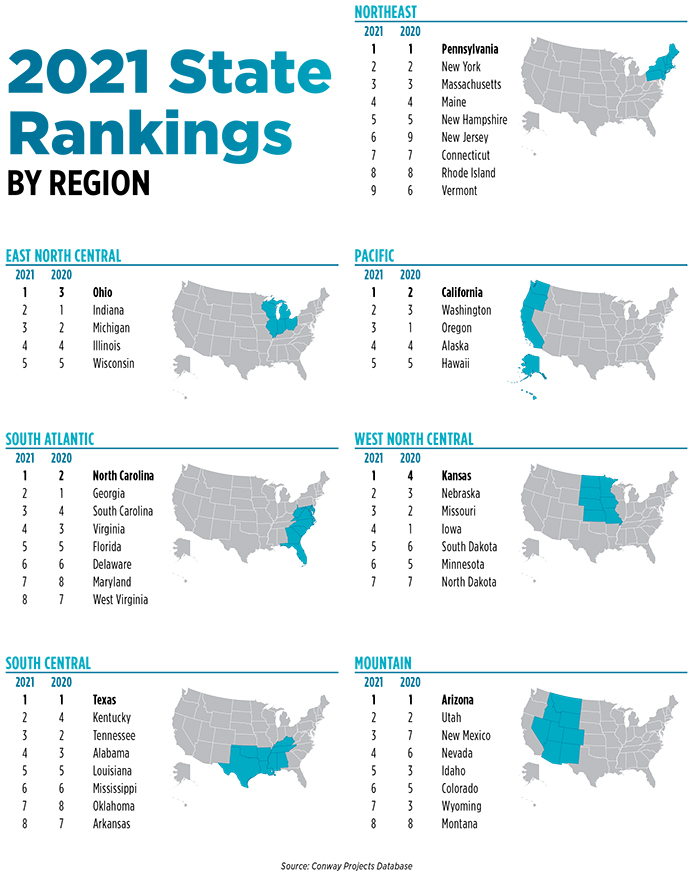North Carolina’s prowess in life sciences, aerospace and statewide business-recruitment teamwork are delivering enviable results.
When Site Selection recognizes a state as having the top business climate in the U.S., you can bet that state is enjoying prosperity. North Carolina returned to the top of our annual ranking of state business climates in 2020, tying Georgia for first place, as was reported in the November 2020 issue. That prosperity presumption is accurate: The Tar Heel State claims Site Selection’s Prosperity Cup this year, which recognizes state-level economic development agency success based on a 10-point index of criteria based largely on capital investment project activity the previous calendar year (see methodology).
North Carolina jumped five spots to win the Cup from sixth place in 2020, replacing Texas in first place. The Lone Star State finished third this year, while second-place Georgia retains its first-runner-up status, underlining the link between a strong business climate and the prosperity that ensues. Two newcomers to the top 10 in 2021 are South Carolina, climbing from 15th place to seventh, and Arizona, which finishes in eighth place, up from 12th in 2020.
Top 10 States
| 2021 | 2020 | State |
|---|---|---|
| 1 | 6 | North Carolina |
| 2 | 2 | Georgia |
| 3 | 1 | Texas |
| 4 | 5 | Ohio |
| T5 | 3 | Indiana |
| T5 | 9 | Kentucky |
| 7 | 15 | South Carolina |
| 8 | 12 | Arizona |
| 9 | 7 | Tennessee |
| 10 | 4 | Michigan |
If the first few months of this year are any indication, North Carolina is on track to make a very strong showing in next year’s Prosperity Cup ranking. The state is up against some tough competition in its geographic region, with Virginia, South Carolina, Georgia and Tennessee, among others, all competing for the same projects it fights for.
“We know that most of the time we are competing with other Southeastern states,” says Chris Chung, CEO of the Economic Development Partnership of North Carolina (EDPNC). “We also know all of those states are very formidable, and we would be foolish to take any of them for granted. Not only are they attractive from a business climate standpoint, but they have economic development teams that are as aggressive as we are in wanting to do everything possible to win those deals. It’s very competitive.”
Apple’s Tar Heel Footprint Expands
In late April, Apple picked North Carolina’s Research Triangle region as the location for its newest research and development campus and will create 3,000 jobs in Wake County. Apple plans to invest more than $1 billion in the state by 2032. The company’s new project in North Carolina will create an R&D, operations and engineering hub in Wake County of at least 1 million sq. ft., powered 100% from renewable energy sources from day one, similar to all Apple facilities worldwide. In addition, Apple will set up a $100 million fund to support schools and community initiatives across the state.
“As a North Carolina native, I’m thrilled Apple is expanding and creating new, long-term job opportunities in the community I grew up in,” said Apple Chief Operating Officer Jeff Williams. “We’re proud that this new investment will also be supporting education and critical infrastructure projects across the state. Apple has been a part of North Carolina for nearly two decades, and we’re looking forward to continuing to grow and a bright future ahead.”

The North Carolina Department of Commerce led the state’s efforts to attract Apple’s new R&D campus. The company will retain its existing 1,100-person workforce at various locations in North Carolina. Apple’s new positions over the entire period of the grant will offer salaries that average $187,001, creating a regional payroll impact estimated to top $550 million per year. Wake County’s overall average annual wage is currently $63,966.
“Apple’s choice to grow in North Carolina comes at an important time for our state,” said Commerce Secretary Machelle Baker Sanders. “As we move past the hardships of the pandemic, we must work even harder to bring new opportunity to all people of our state. Companies like Apple, with its tangible commitment to equity and justice issues, add an important perspective to this conversation and we welcome them to our state.”
Apple’s project in North Carolina will be facilitated, in part, by a Job Development Investment Grant (JDIG) approved by the state’s Economic Investment Committee. The project is estimated to grow the state’s economy by nearly $79.8 billion over 39 years, the time period the grant could be active. The 3,000 new jobs will generate $1.97 billion in new tax revenues to the state over the grant period. Using a formula that takes into account these new tax revenues, the JDIG agreement authorizes the potential reimbursement to the company of up to $845.8 million. This potential payment would also be spread over 39 years.
Billions More in Life Sciences Investment
Life sciences is a sector in which North Carolina routinely competes and wins. In 2020, domestic and global life sciences companies announced expansions expected to bring nearly $3 billion in new investment and over 4,800 new jobs to the state; more than 770 life sciences companies employ more than 67,000 highly skilled people in North Carolina. This year has already seen several biotech projects worth billions of dollars in investment.
In March, FUJIFILM Diosynth Biotechnologies U.S.A. Inc., a leading contract development and manufacturing organization (CDMO), announced it will create 725 jobs and expressed its intent to invest $2 billion in Wake County. The company will build North America’s largest end-to-end biopharmaceutical manufacturing facility in Holly Springs, in North Carolina’s Research Triangle region, which is home to one of the largest life sciences industry clusters in the U.S. (See our interview with the company’s CEO on p. 40 of this issue.)

“This project advances the state’s already significant global reputation in the life sciences industry,” said Melissa Smith, vice president of business recruitment for the Economic Development Partnership of North Carolina, which helped recruit the project on the state’s behalf. “The fact that FUJIFILM Diosynth Biotechnologies chose Holly Springs — which is also home to a major facility of vaccine producer Seqirus — may signal growing interest by companies in smaller metro locations for their big operations,” Smith added. “Also, FUJIFILM Diosynth locating in southern Wake County extends the reach and economic impact of the state’s life science clusters. We expect such a large project will draw employees from nearby counties such as Lee, Harnett, Johnston and Chatham.”
The company’s North Carolina site has been in operation since 1996. The campus has expanded since its inception to include three buildings that house the company’s Process Development and Analytical Laboratories, cGMP Manufacturing Facility, and Administration. The site has more than 600 employees today.

In April, San Francisco-based medical genetics company Invitae Corporation announced plans to build a major testing and laboratory facility in Wake County, creating 374 jobs and investing $114.6 million in Morrisville over the next decade. The project will establish an advanced genetics testing laboratory on the East Coast of the United States to support Invitae’s fast-growing business. The Morrisville lab is expected to initially ramp up capacity to volume levels similar to Invitae’s flagship San Francisco laboratory facility, with additional growth projected in future years.
“As we continue to expand to support our rapid growth in the U.S., we were eager to identify a location on the East Coast that would improve our ability to serve our customers, improve our operational leverage, and build a talented team with connections to a vibrant life sciences community. We have found the ideal location in North Carolina,” said Ken Knight, chief operating officer of Invitae. “Our mission is to make genetic information affordable and accessible for billions of people. Our new location near the Research Triangle Park will help us bring that mission to reality.”
The Charlotte region has been named the most attractive market for life sciences professionals by Jones Lang LaSalle IP, Inc. in its 2021 Life Sciences Emerging Markets Index.
The average salary of the specialized new positions will reach $91,176, although specific wages will vary depending on job role. The regional economy is expected to eventually benefit from more than $34.1 million in total payroll impact each year, and salaries for technical and specialized jobs at the facility are expected to be significantly above the average wage in Wake County, which currently stands at $63,966.
In February, biopharmaceutical company Gilead Sciences, Inc., selected North Carolina’s Research Triangle region as the location for a major business services and information technology hub, creating 275 jobs. The company will invest up to $5 million in Wake County. Based in Foster City, California, Gilead Sciences discovers, develops, and commercializes medicines in areas of unmet medical need. Gilead’s primary areas of focus are virology, inflammation and oncology. The company’s project in North Carolina will create a new Business Services center delivering financial, human resources, and information technology services, including cybersecurity and digital transformation initiatives. The state and local area will see a yearly economic impact of more than $39 million from Gilead’s investment.
Advanced Life Sciences Credentials
Why so much winning in the life sciences industry?
“Part of it is the large cluster that already is here, and a lot of that was seeded with the Research Triangle created several decades ago with the confluence of the major research universities,” says EDPNC’s Chung. “These days, many companies don’t want to be an island unto themselves, especially if they’re trying to hire a workforce from scratch. Talent doesn’t want to go work for a company if it’s the only life sciences company in town. It would be risky to move there because you’d be stuck if it didn’t work out.”

Wake County and the Research Triangle may be making headlines with recent life sciences success, but the Charlotte region has been named the most attractive market for life sciences professionals by JLL in its 2021 Life Sciences Emerging Markets Index. The Raleigh-Cary area followed closely behind, placing seventh in the country.
In compiling the report, JLL examined 110 United States markets, considering venture capital funding, NIH funding, lab developers, clinical research and other factors. Ultimately, it identified three necessary categories for success: momentum, talent and potential. Momentum identifies which job markets are growing and how salaries compare, broken down into employment acceleration and wage positioning. Employment acceleration indicates growth and maturation, measured between 2010 and 2020. The Charlotte region came in ninth place nationally, meaning hiring practices are expanding. In measuring wage positioning, or the area’s wage proximity to the industry average, the Durham-Chapel Hill area came in fourth place while the Raleigh-Cary area came in sixth.
The Triangle is “boosted by lower cost of living,” says JLL, while other established life sciences markets remain high. JLL measured potential by combining momentum and talent, while also weighing an area’s ability to attract young professionals. The millennial generation is the future of the life sciences, JLL maintains. Building a successful business ecosystem relies on appealing to young employees who will put down roots and spend their careers there.
“It’s nice to see the validation from the JLL report confirming what we have been seeing in our growing life sciences sector,” said Doug Edgeton, president and CEO of the North Carolina Biotechnology Center. “This is happening across North Carolina, particularly in the RTP market. It’s important to see this recognition that Charlotte is a hotbed for life sciences expansion as two new medical schools emerge in that market,” he added. “Our coveted ability to work together with all the partners who make economic development effective, while remaining focused on meeting the needs of companies electing to put down roots or expand their operations, has been a winning hand for our state. This welcoming and collaborative environment filled with next-generation talent, combined with super-competitive corporate and personal tax rates, are enough to win over many projects. Adding the excellent quality of life with the natural beauty of this part of the country is icing on the cake.”

“ We never take for granted large project wins when we go head to head against other states.”
Another formidable resource for life sciences companies, says Chung, is a specialized training institution called the Biomanufacturing Training and Education Center (BTEC) on North Carolina State University’s Centennial campus, that’s funded by the state’s tobacco settlement. “The Golden Leaf Foundation invested in this a decade ago, and it’s a linchpin in how we continue to produce a pipeline of skilled workers who satisfy the hiring needs of bio companies,” he relates.
BTEC operates two facilities: the 77,700-gross-square-foot main building and the 5,000-gross-square-foot BTEC Annex in the Keystone Science Center. The two facilities feature more than $18 million of industry-standard equipment and a simulated cGMP (current Good Manufacturing Practice) pilot plant facility capable of producing biopharmaceutical products using cell growth and expression, recovery, and purification processes. Undergraduates, graduate students, and working professionals come to BTEC for hands-on learning with the latest biomanufacturing technologies.

Pratt & Whitney’s Asheville Play
Aerospace is another industry finding in North Carolina the locations those companies require. It’s hardly a new industry in the state, with more than 200 such companies, including GE Aerospace, Spirit Aerosystems and HondaJet, and more than 400 of their suppliers.
North Carolina is home to more than 200 aerospace companies, including GE Aerospace, Spirit Aerosystems and HondaJet, and more than 400
of their suppliers.
Pratt & Whitney, a division of Raytheon Technologies Corp., announced in October 2020 that it plans to invest at least $650 million through 2027 in a world-class turbine airfoil production facility in Asheville. The new, 1-million-sq.-ft. facility will house an advanced casting foundry for the production of turbine airfoils as well as conduct machining, coating and finishing of airfoils onsite. The investment is intended to create 800 new jobs in Buncombe County.
“This investment will enable Pratt & Whitney to continue to modernize and transform its operations with cutting-edge technologies,” said Chris Calio, president, Pratt & Whitney. “Turbine airfoils are a critical component across our engine portfolio and demand will increase significantly as the market recovers over the next several years. We need to invest today to ensure that we have the infrastructure, production capabilities and workforce in place to meet future market demand and provide the best products to our customers worldwide. We are grateful for the support provided by the State of North Carolina and the local community.”
“Apple’s choice to grow in North Carolina comes at an important time for our state. As we move past the hardships of the pandemic, we must work even harder to bring new opportunity to all people of our state. Companies like Apple, with its tangible commitment to equity and justice issues, add an important perspective to this conversation and we welcome them to our state.”
The project is a good example of North Carolina’s competitiveness, says Chung of EDPNC, since states known for signature aircraft manufacturing and assembly complexes, such as Alabama (Airbus) and South Carolina (Boeing) were certainly in contention.
“Pratt & Whitney started with some conversations at the Paris Air Show around what their future growth needs were,” Chung relates. “We knew that it was highly competitive and closing the deal would be something any state would love to have. Teamwork is very necessary, which is perhaps somewhat cliché in economic development, but there’s a lot of truth to it. It takes a lot of different entities at different levels at different points in the engagement to push this deal along.”
“Our mission is to make genetic information affordable and accessible for billions of people. Our new location near the Research Triangle Park will help us bring that mission to reality.”
The state, local economic developers and private-sector utilities all were involved, of course, but another entity helped seal the deal for Asheville. “In the case of Pratt & Whitney, Biltmore Farms controlled the real estate where they’re locating. They are a real estate developer with a very special, historic connection to Asheville. They want to turn a profit on real estate development, but they also want to make Asheville a more economically diverse, prosperous community long term. That motivation is what enabled Biltmore Farms to come to the table in the way they did to help land Pratt & Whitney’s investment.”
The team players will vary from project to project, says Chung, but the bottom line is this: “There are a lot of points in recruiting major projects where failure to do any one thing to the effect the company requested might have cost us the project to a competitor. But the fact that everyone did their role well speaks to why the outcome was what it was. We never take for granted large project wins when we go head to head against other states.”
Prosperity Points
Following are the criteria used to arrive at final scores determining the competitiveness ranking of the states. The first six criteria are based on project data resident in Site Selection’s Conway Projects Database:
- Total new and expanded facilities in 2020
- Total new and expanded facilities in 2020 per 1 million population
- Total capital investment in new and expanded facilities in 2020
- Total capital investment in new and expanded facilities per 1 million population in 2020
- Total new jobs created in 2020
- Total new jobs created in 2020 per 1 million population
- Rank in the corporate real estate executive portion of the 2020 Site Selection Business Climate Ranking
- State tax climate as ranked by the Tax Foundation
- Performance in the Beacon Hill Institute’s State Competitiveness Index
- Number of National Career Readiness Certificates per 1,000 residents aged 18-64, according to ACT — Workforce Development Division, administrator of the ACT Certified Work Ready Communities initiative.

